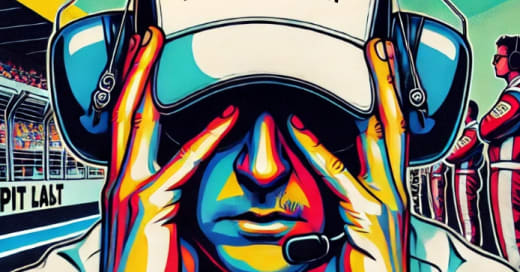On Coaching Racing Drivers
If you work with drivers, or you're a parent, it won't take long to realise your driver does not care what you say, but also continues to make the same mistakes. Here's how I manage to get through it.
Welcome to Terence Dove on racing drivers. This week, I’m going to talk about the principles I use when working with drivers.
This will help you a lot if racing drivers do your brain in!
I’ve spent years agonising over this stuff, and finding different ways to get through to drivers - which often seems impossible. Here’s what has worked for me so far more effectively than anything else.
Start with a Core Principle - Great People Make Great Drivers, Not Vice Versa
The overriding principle behind everything I do is to help drivers become great people through racing. And by “great,” I don’t mean they’re simply nice or likeable. I mean strong, brave, and unstoppable—hardcore individuals who take risks and blow your mind with what they can achieve.
Once a driver becomes that kind of person, becoming a great driver is just the natural next step—if that’s what they choose. They might just as easily decide to take on something else, like competing with Elon Musk to get to Mars.
The point is, I don’t want to create one-trick ponies who are incredible behind the wheel but unimpressive in life. There are plenty of good drivers, even excellent ones, who don’t seem to carry the strength they’ve developed in racing into anything else. That’s a tragedy to me. Racing is such an intense arena for personal growth, and it should produce individuals who are capable of greatness across the board.
Confidence is King with Drivers
What I’m really building in drivers is confidence—real, unshakeable confidence. And I do this through driving skills, because skills are the foundation for confidence. Winning races requires skill, but skill alone isn’t the end goal. The real aim is to use those skills to make drivers genuinely confident in themselves.
Confidence comes from three key areas: skills, self-efficacy, and self-esteem. All three are essential, and they work together to create a driver who’s borderline arrogant—super confident in their ability to take on anything.
1. The Easy Bit - Building Driving Skills
Skills are the starting point because they’re the easiest to build. When I work with a driver, I help them break down specific techniques, like how to feel the braking point, hit the brakes hard, and control a braking-induced slide. These are things they can practise and master until they have breakthrough moments where they think, “Wow, I didn’t think I could do that.”
It might be something as simple as backing a kart into a corner. The moment a driver nails it for the first time, their belief in themselves starts to grow.
2. Where it Gets Tricky - Developing Self-Efficacy
Self-efficacy is the belief that you can use your skills to achieve a specific outcome in a given situation. It’s not just about having the skill; it’s about trusting that the skill will work when it counts. For example, a driver might be wicked on the brakes, but if they don’t believe they can use that skill to overtake another driver, they’ll hold back.
A lot of the time, I’ll hear people say, “My driver’s brilliant on the brakes, but they won’t chuck it up the inside.” That’s low self-efficacy. It’s separate from the skill itself, but just as important.
To build self-efficacy, I’ll help drivers break a move like overtaking into smaller components. They need to understand the rules of engagement—things like positioning, where to look, how to assess another driver’s weaknesses, and how to control a kart at an apex. As they piece these together, they start to see how their skills add up and realise they can do it.
Sometimes it takes showing them video footage of another driver doing something similar, pointing out how the move mirrors what they’re already capable of. That can be the moment the dam breaks, and their belief in their ability to use their skills properly floods in.
3. Drivers Must Believe They Deserve To Win - Building Self-Esteem
Self-esteem is how much a driver values themselves overall. This is crucial in racing because you’re not just trying to win—you’re trying to take victories from others. You’ve got to believe you deserve to beat them.
It’s not about snobbery. It’s about certainty. A driver with high self-esteem will think, “I’m better than you, I’m faster than you, and I’m going to win this race.” That belief has to be immediate and unshakable because racing is a high-stakes environment.
If a driver doesn’t value themselves enough, it’s easy to back out of moves or psych themselves out by focusing on how great other drivers seem. They’ll look at their opponents, their teams, or their equipment and think, “How can I possibly go up against them?” That mindset undermines everything.
When you build up a driver’s self-esteem, they start to see that they’re capable and worthy. They don’t hesitate to make decisions or take risks. That’s when their confidence becomes second nature, and they start winning races instinctively.
Using Nobel Level Approach to Interact with Drivers
Keep reading with a 7-day free trial
Subscribe to On Racing Drivers by Terence Dove to keep reading this post and get 7 days of free access to the full post archives.




